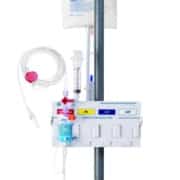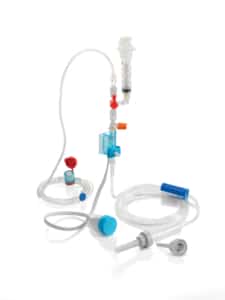Blood-Pressure Monitoring During the COVID-19 Pandemic
As a result of the COVID-19 pandemic, many people have been in hospitals under critical care this year. These patients require beat-to-beat blood-pressure monitoring, which helps clinicians see important vital signs about the patient in real time over the length of the critical-care treatment and make clinical decisions accordingly. Therefore, continuous, reliable monitoring of a patient’s blood pressure is as important as ever.
Merit Sensor has been a supplier of blood-pressure sensors since 2010. Our parent company, Merit Medical, to whom we supply blood-pressure sensors, is one of the global leaders in blood-pressure transducers. Check out their newest transducer, the Meritrans DTXPlus. Through our experience and that of our parent company, we have learned what matters most to clinicians using invasive blood-pressure devices.
One important factor is that the fluid column from the needle to the sensor should be free of bubbles. Bubbles dampen the pressure pulses in the fluid column and, therefore, degrade the conversion of the pressure signal. To prevent bubbles, clinicians routinely tap or whack the blood-pressure transducer with a hemostat or forceps. This certainly poses a risk to the integrity of the pressure sensor and can cause even greater issues than just dampened signals. However, due to the insight provided by our parent company and our in-house expertise, we have improved the BP Series design over the years and have produced a robust pressure sensor that is able to withstand this common debubbling practice.
Another common-enough issue that could destroy a pressure sensor is the inadvertent opening of the transducer’s stopcock to an undesired pressure source. For example, when a clinician injects medicine or contrast through the line, there is a pressure spike of around 300 psi in the line. This is considerably greater than the typical pressure of blood pressure, which is around 2 psi. In order that the pressure sensor be accurate at such a low pressure, it must contain a very thin MEMS diaphragm. At Merit Sensor we have designed a blood-pressure-sensor package that provides accuracy at low pressure yet robustness when exposed to overpressure. The BP Series has a typical burst pressure of > 800 psi. As long as the overpressure does not damage the MEMS diaphragm or the sensor package, the sensor will return to its specified performance once it is again within its operating pressure range of −30 to 300 mmHg.
In addition to providing a robust pressure sensor that can withstand forceful tapping and high overpressure, Merit Sensor has complete control over its manufacturing processes and supply chain. We own and operate a wafer fab in South Jordan, Utah (USA). Our on-site wafer fab enables us to monitor production closely and ensure high quality with everything we produce. It also gives us the flexibility to meet unique requirements of our customers, who might have a unique application for a blood-pressure sensor. With Merit Sensor you get reliability as well as flexibility.
To learn more about the advantages of owning and operating a wafer fab, read this interview published by AZoSensors.





